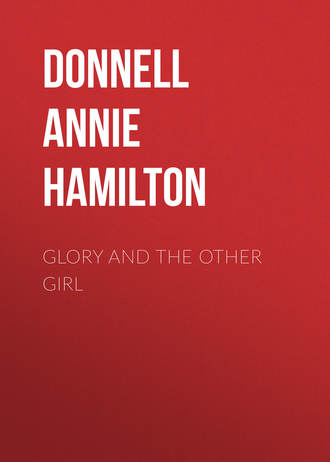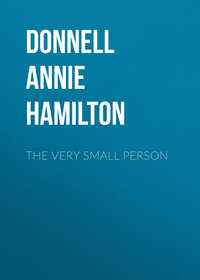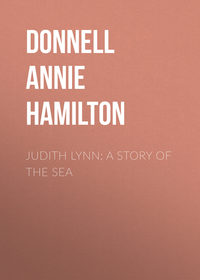 полная версия
полная версияGlory and the Other Girl
“It was just as quiet and nice-behaved and beautiful as any supper, only there wasn't anything to eat! Oh, auntie, you know what I mean! You know I mean there were the muffins (they were splendid) and the tea and dried apple sauce. I had more than I could eat. But you don't know how I wanted to fill that pale little lady's plate with some of our chicken and gravy and set by her plate a salad, after she'd worked all day. And pile Tiny Timmie's plate tumble-high with goodies! It made me ashamed to think of all the beautiful suppers of my life that I've taken without even a ‘Thank you, God.’”
The two girls went to bed early and lay talking, as girls have done since girls began. The topics of talk drifted through the different lessons into personal subjects.
“Do you know, I'm hoping!” the Other Girl burst out softly, with a little quiver of her thin body under the quilts. “I began to last night. I'm going to do it right from now on. Maybe it's silly, but I am.”
“Is it a riddle?” asked Glory.
“Oh, don't you understand? I thought you must, because I did! I mean I'm hoping to pass the examinations for the next grade next summer. That's just what I'm doing, Glory Wetherell.”
“Why, that's nothing! I am going to pass, too. If I get through the seminary I am going to Smith College some day.”
“And if I pass for the eighth grade I'm going to keep right on studying for the first grade in high-school. Miss Clem says I can. I talked with her the other night. She says she'll help. Oh, Glory, there is no end to this road you have started me on.”
“I am glad,” said Glory. “Auntie says for folks to keep on when they're doing well enough, and not fret about the other end of the road. One never knows what's on ahead or what may happen.”
“And if I ever get to be anybody, Glory Wetherell, remember it's you who started me.”
After a while the subdued chattering ceased, and the two girls fell asleep, Glory to dream that she and her new friend graduated together from the Centre Town Seminary, in beautiful twin white dresses, and that Aunt Hope was there and clapped her thin, white hands (but they were round and pink-tinted in the dream) when she heard Glory's valedictory.
The Other Girl's dream was of longed-for luxuries for the patient mother and legs that matched for Tiny Tim. Both dreams came to an end in a startling way.
Chapter VI
Glory and Diantha were awakened from their rosy dreams by a sharp voice calling, “Fire! Fire!” They started up in affright, only to find little Timmie perched on the foot of the bed, crying monotonously, “Fire! Fire!” and interspersing his fire-alarm with brisk drummings of his crutch against the footboard. But though he had alarmed the girls, he himself did not look alarmed.
“Fire! Fire! Fi – ”
“Timothy Leavitt, where is it? Tell me quick!” his sister gasped breathlessly.
“In the kitchen. Fire! Fire! Fi – ”
“The kitchen? What part of it? – where?”
“In the stove. I built it,” Timmie said in an aggrieved tone, but his eyes were glinting with mischief sparks. “I built it hours ago, an' you didn't get up – an' you didn't get up! I didn't s'pose we'd ever have breakfast unless I wokened you up.”
“You bad little boy! So you went and made us think there was a fire?”
“Well, there is – I built it, so there!”
Glory was still laughing periodically over their fright, when they got to the station to take the train. She had the picture of innocent-faced Timmie still in her mind, and the monotonous drumming of his little crutch, between his alarms, in her ears.
“‘Fire! Fire! Fire! Fire!’” she sang laughingly. “Didn't the little scamp give us a fine scare, though! But he woke us up!”
“Oh, yes, he woke us up,” answered the Other Girl, grimly.
After morning recitations, the Principal of the Centre Town Seminary had a caller in her office. It was Glory, with a pretty little air of pleading about her. She came in, in answer to the Principal's “Come,” and stood, a suppliant, in the doorway.
“Are you busy? Ought I to go away?” she asked. “You see, I've got quite a lot to say.”
“Then say it, my dear,” the Principal smiled pleasantly. “Sit down in that chair and begin.”
“Well, then – oh, Miss Sweetwater, can't my friend graduate with me? I mean, if you let me graduate – or if you don't let me – I mean can't she graduate, anyway? She is a splendid scholar, and – and she needs to graduate somewhere! You'll let her, won't you?”
The Principal smiled. “Who is your friend, Glory?” she asked.
“She's Diantha Leavitt, and she works in the rubber factory, and studies just awfully at home, and I help her some going and coming on the train.”
“Oh, she is not one of the Seminary girls, then? She has never been here? Dear child, how do you think she can graduate if she has never been here to school?”
Glory's eager face fell. “I didn't know but you'd let her,” she said, slowly. “She's just as smart as can be. I'm just sure she can pass the examinations. It would mean so much to Diantha to pass. I'm sorry I troubled you, Miss Sweetwater – I didn't know.”
But the kind-hearted Principal detained Glory and drew out the whole wistful little story of the Other Girl. At the end, she said, “I am glad to know of her. Such a girl must be encouraged. I will keep mindful of her and see if I cannot help her in some way.”
“Thank you. I hope you can help her. She wants to do so much if she can ever get to earning. It seems as though almost anyone could learn if they had a mother to help, and a Tiny Tim. There's an Aunt Hope. I can do it for her. I'm glad I've got to work. And thanks to Di, I do not stand so bad a show of graduating – with a great deal of honor, too. Dear old Di!”
More of the late winter days snowed past, and there came, by and by, hints of spring – faint suggestions of green in the bare, brown spots, whiffs of spring tonic in the air and clear little bird-calls overhead. New courage was born in Glory's heart and the Other Girl's, and both studied harder and harder with each day that went by. The Crosspatch Conductor took note of the two brown heads bent over the book and wondered behind his grim mask.
“What is it, anyhow?” he asked one day, late in the spring, stopping before them in the aisle.
The two pairs of eyes met his laughingly. “Oh – things. Splendid things!” Glory said. “Certificates and diplomas some day, and sick folks with glad faces, and little boys with twin legs! Isn't that enough to ‘pay’?”
“Umph!” the Crosspatch Conductor muttered in his beard, and strode on down the aisle. But he beckoned Glory aside that night on the home trip and questioned her about the Other Girl. Glory told him the whole story in a few hurried words.
“That's why she's studying so hard,” she wound up, out of breath. “She wants to get it all and some day be a teacher.”
“And you're helping her,” the Crosspatch Conductor said, gruffly.
“Mercy, no! She's helping me. That's why I'm studying so hard! I don't see what you mean – oh! In the very beginning, you mean? That? I'd forgotten there ever was a time when I helped her. I s'pose I might have a little, at first.”
The conductor put his big hand on Glory's shoulder with a touch as light and caressing as that of a woman.
“You're the right kind, both o' you,” he said. “It never comes amiss to help anybody. I've half a mind to try a little of it myself. See here, don't you tell her and go to raising hopes, but it kind of seems to me as though I knew a place where she could teach right away. I know a boy who hasn't any mother that wants to learn things. She'd make a pretty good sort of a teacher for a little feller who can never go outdoors and get the sunshine, and all that, now wouldn't she?”
“Oh, are you sure there is such a boy? Can you get him for Diantha? Would it pay her money – lots of it?”
“Easy! Easy! Don't go too fast. It wouldn't pay her a fortune, 'cause fortunes ain't found like hazel nuts, growing on bushes. But it ought to pay her pretty tolerable. I'm sure enough about the boy;” and a sad look came into the conductor's eyes. “He hasn't any mother, you see, and it's pretty hard for the little chap.”
“Is he your boy?” asked Glory, putting her little hand on the conductor's sleeve and looking sympathetically up into the grave eyes.
The conductor nodded. “He's mine, and his grandmother says he ought to be learning things – poor Dan! That girl over there wouldn't be a very bad one to help him get hold, now would she?”
“Oh! Oh! Oh! What will she say? Why, if I had a little boy and he couldn't go out into the sunshine, and he wanted to learn, I'd rather have Diantha's little finger to help him with than the whole of some folks. You don't know Di.”
The conductor laughed. “I guess I haven't been watching you two this winter without finding out something,” he said, his eyes holding a twinkle. Then the old, gruff manner came back to him and he added brusquely, “But there, don't you go to countin' the chickens before they're hatched. I'll have to talk with grandma first; maybe she'd rather have a sort of circumspect person.”
“But your Danny wouldn't – you said his name was Dan,” said Glory, her face one sea of dimples, and her eyes like diamonds. “'Most seems as if a little boy who couldn't go out in the sunshine ought to have the one he'd like best with him. He wouldn't care much for a – a circumspect person, would he?” asked Glory, a merry twinkle in her eyes.
“There now, you go along!” said the conductor, laughing in spite of himself.
But Glory did not “go along” until she had caught the big hand and squeezed it between her soft little palms as it was extended to help her down to the Douglas platform.
That night Glory could hardly wait to get to Aunt Hope.
“Oh, auntie, won't it be splendid if she gets that place!” she cried when she had unfolded the beautiful plan at which the conductor had hinted.
“But you mustn't set your heart on it, Glory. The grandmother may not think that so young a girl will do for the boy.”
“She will when she sees Diantha, auntie – I am just sure of it. Di is so strong and helpful, and so cheery, and so full of courage, and never thinks of herself, but always of others.”
“Well, dear, we will leave it in the good Father's hands, and just ask him to bring it out in the way that is best for all.”
June and all its glory was touching the world, and the sweet air, full of the perfume of rose and honeysuckle, crept in and fanned two faces close together on the sofa pillows.
“Auntie, you haven't called me ‘Little Disappointment’ this ever so long,” Glory said suddenly after a long silence. “Is it a good sign? I thought – well – maybe it was.”
“Dear child!” Aunt Hope's arms were round Glory, holding her in their feeble, loving clasp. “Dear child, did I ever call you that? Are you sure? Well, I shall never do it again, dear, as long as we twain shall live! Do you want a new name, Glory?”
“Yes'm, please,” murmured the girl.
“Then you are my Little Ambition, and God bless you, dear!”
After that it was still again, and the cool darkness wrapped them in softly. They could hear the solemn tick-tock of the clock across the room. It was the same clock that used to say reproachful things to Glory when she was a little child and had been naughty. Once she had climbed on a chair and stopped its accusing tongue, because she could not bear it any longer. It was talking to Glory now, and she could not make it say anything but “Dear – child! dear – child!” over and over, solemnly. It was Aunt Hope's voice it was trying to imitate. Glory laughed out softly, under her breath.
“What is it, dear child?”
“Dear – child! dear – child!” echoed the clock solemnly.
“I've got to get up and stop that clock!” Glory said.
The week before the graduating exercises at the Centre Town Seminary, Glory had another of her “ideas,” and of course she carried it to Aunt Hope.
“Why not?” she said, when she had introduced it to her. “It would be like one of Tiny Tim's plays. He could go, too, and help us ‘play’ it, don't you see? I think I should enjoy graduating better if Diantha ‘played graduate’ with me. The teacher wouldn't care if she sat with me down on the end seat. I don't believe she ever had a white dress in her life – a soft, thin, floaty one.”
“Would you like to have hers just like yours, Glory?”
“Just, auntie. She's the – the friendest friend I ever had,” Glory said simply. “I'd like to have her close when I'm there getting ready to read.”
And so it came about that graduation day found the Other Girl beside Glory, in a beautiful white dress that lay about her in soft, sheer folds. The Other Girl's face above it was shining and rapt. This was almost like graduating herself. On the other side of Glory sat Tiny Tim, in the conscious pride of his best suit. There was no little crutch in sight. Timmie had hidden it under the seat. He was playing “Uncrutchit.”
“You can't see – an'thing, can you?” he whispered anxiously to the Other Girl, across Glory's lap.
“Not a splinter of it, Timmie.”
“An' you don't see where my legs don't match, do you?”
“No, not a single bit.”
“That's all right, then.” Timmie's brow smoothed with relief. He was silent a moment, and then his little whispering voice again, this time to Glory:
“Say, isn't this just splendid! I'm playin', an' Di's playin'. You're the only one that's it, honest true.”
Another silence. Then, “Say, I'm sorry I wokened you up that time, screamin' ‘Fire!’”
Glory laughed down into the repentant little face. “I'll forgive you, Timmie,” she whispered. And then the exercises began and the air was full of a blast of jubilant music.
When it was all over, the three went back to Little Douglas together on the train. There was to be a bit of a banquet in Aunt Hope's room.
Glory had a neat white parchment roll in her hand, and she held it shyly, as if she had not had time to get very well acquainted with it.
“To think this is a diploma with Gloria Wetherell in Latin inside it!” she cried.
“To think this is a beautiful white dress with me inside!” answered the Other Girl. “Do you know – oh, do you know, it doesn't smell of rubber at all? There isn't a whiff about it; it's just sweet and dainty and —other-folksy.”
On the train the Crosspatch Conductor drew Glory aside a moment. His eyes rested first on the parchment roll.
“Got it, didn't you? Good! Well, I've got it too. She's consented – grandma has. I've told her all about the other one, and what you said, and it's going to be all right. We won't tell her yet until we get kind of used to it ourselves, don't you see?”
“Oh, I'm so glad!” cried Glory, clasping her hands. “I don't believe I ever can keep it. To think she'll leave that old rubber factory and be in a nice, pleasant home all the time, and help her folks, and be having some of her dreams come true. I wonder what she will say!”
“I thought we'd get her over to the house and have Danny tell her. He's a great one for setting things out.”
“You're the best man I ever knew in the wide world!” said Glory. “But I can't keep it very long – you mustn't expect me to.”
The conductor laughed. “All right – all right. I'll get grandma to write. I've got her address. One of the men down at the factory told me a good deal about her. There are many ways of finding out about folks when one sets about it.”
“Well, you'll never find out anything about Diantha but what's nice,” said Glory. “Oh! I'm so glad!” And not a happier girl than Gloria Wetherell could have been found in all that region.
As to the Other Girl, her heart nearly burst with its weight of happiness when she found out what was in store for her.
“It's Glory's doings. She has just glorified my whole life, and helped me to find the rainbow. And Timmie! – won't I find a rainbow for him too, bless him! And some day his legs shall be twins, if working can do it.”



